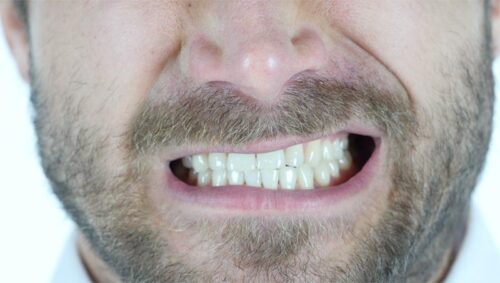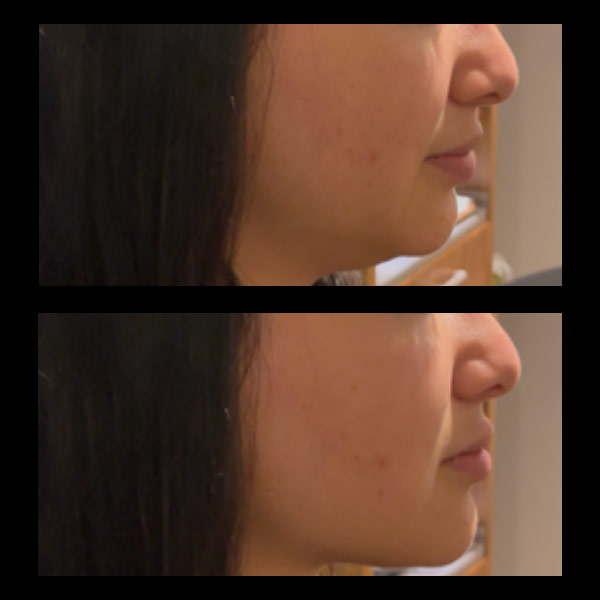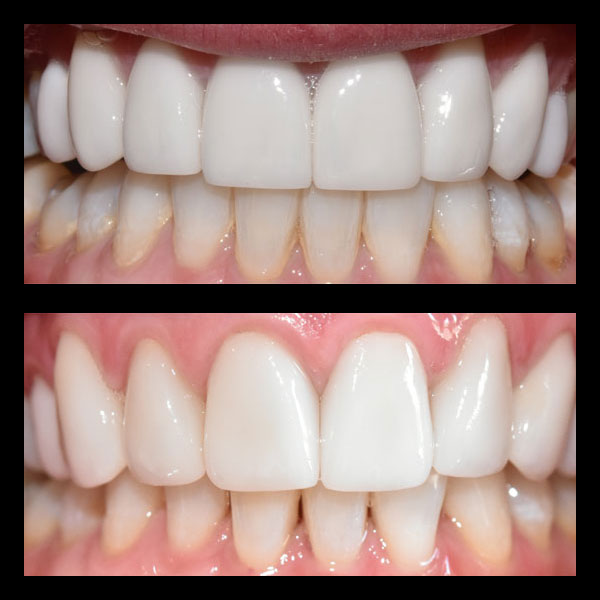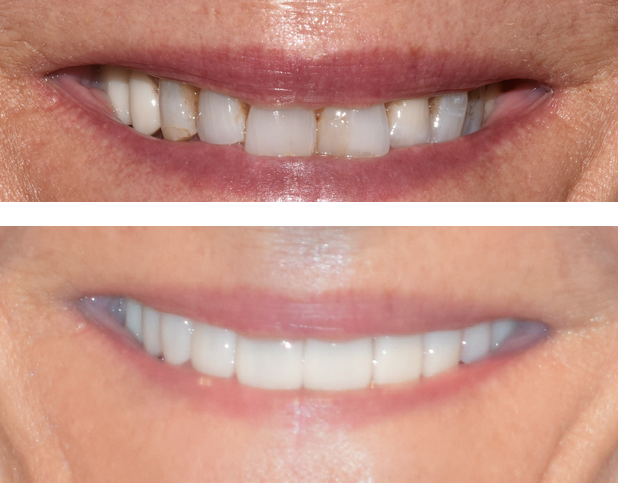 Has a good night’s sleep ever been disrupted by an unexpected grinding sound? It’s not an appliance or a squeaky door; the noise is coming from inside your mouth. Your teeth are engaged in an unconscious workout, grinding against each other, damaging enamel. This condition, known as bruxism or teeth grinding, may seem harmless, but has the potential to risk your oral and overall health.
Has a good night’s sleep ever been disrupted by an unexpected grinding sound? It’s not an appliance or a squeaky door; the noise is coming from inside your mouth. Your teeth are engaged in an unconscious workout, grinding against each other, damaging enamel. This condition, known as bruxism or teeth grinding, may seem harmless, but has the potential to risk your oral and overall health.
Dental health often takes center stage with brushing, flossing, and routine check-ups. However, grinding teeth tends to hide in the shadows. This overlooked behavior has implications that reach far beyond oral health. It can lead to headaches, change your facial appearance, and even cause tooth pain. Our aim is to help guide in recognizing, understanding and addressing this aspect of oral health proactively.
What is Bruxism?
Have you ever woken up to a dull headache or sore jaw? You could be experiencing a common yet often overlooked condition known as bruxism, or teeth grinding. This condition primarily occurs during sleep, but it can also happen in daytime during periods of stress or intense concentration.
Grinding can be triggered by various factors, like stress or anxiety. However, it isn’t just emotional strain; physical factors like an irregular bite or crooked teeth can also cause grinding. Other triggers include alcohol and caffeine consumption, certain medications, and disorders like sleep apnea.
Identifying the Symptoms
Recognizing that you’re grinding your teeth is not always straightforward, especially when it happens in your sleep. However, certain signs can indicate the presence of this condition. If you frequently wake up with headaches or experience jaw soreness, you might be grinding your teeth. Other symptoms include facial pain, disrupted sleep, and worn-down, flat, or chipped teeth. Increased tooth sensitivity or worn enamel can also be a sign.
Though it might seem inconsequential, this can significantly damage your oral health if ignored. The constant friction can wear down the protective enamel on your teeth, increasing vulnerability to cavities and decay. It can also heighten tooth sensitivity, causing discomfort when consuming hot or cold food and drinks. Grinding, in its extreme form, can even result in fractured teeth or fillings, thereby requiring significant dental intervention.
Don’t let teeth grinding ruin your healthy smile. Stay alert to these symptoms and triggers. Addressing the issue not only protects your teeth but also prevents the possible systemic health risks associated with bruxism.
Teeth Grinding and Dental Complications
Teeth grinding poses serious risks to your dental health by wearing down the protective layer of enamel on your teeth, exposing them to various problems. It initially targets the tooth enamel, the hard, durable outer layer of your teeth. Constant grinding wears it away, leaving the softer, more sensitive parts of your tooth exposed. This exposure can result in pain and sensitivity when you consume certain foods or drinks, like ice cream or hot coffee.
Tooth and Filling Damage
With the protective enamel gone, teeth become susceptible to further damage. The relentless pressure can crack or even break your teeth, which can be quite painful and often requires extensive dental work to repair. There is also a threat to the durability of fillings. Cracked or broken fillings allow bacteria to enter, which can cause tooth decay or infections, leading to more complex dental procedures like root canals or crowns. Addressing teeth grinding is far simpler than dealing with these issues.
But the impact on your oral health isn’t limited to your teeth. Persistent grinding can cause disorders in the temporomandibular joints (TMJ) – the joints just in front of your ears which enable your mouth to open and close. This can result in chronic pain and difficulty in everyday tasks like eating and speaking.
Teeth grinding might seem trivial, but it can cause serious dental complications. If you notice signs of wear on your teeth, or often wake up with a sore jaw or headache, it could be due to grinding. Consult a dental professional promptly to protect your oral health.
Health Risks Beyond Dental Damage from Bruxism
Bruxism extends beyond dental health, potentially leading to a range of broader health issues. Continuous teeth grinding creates pressure and friction that extends beyond your oral cavity. This strain results in persistent headaches, often likened to migraines, which can be debilitating. Furthermore, this ongoing pressure can cause discomfort in your neck, leading to stiffness, tension, and overall fatigue.
Temporomandibular Joint Disorders (TMD)
Teeth grinding can also lead to temporomandibular joint disorders (TMD), conditions that cause pain and dysfunction in the jaw joint and the muscles controlling jaw movement. Considering that your jaw is the most used joint in the body — vital for talking, chewing, and expressing emotions — any disorder can be agonizing.
Constant grinding stresses the temporomandibular joint, causing it to wear down over time. This wear and tear can result in persistent jaw pain, difficulty chewing, and problems opening and closing your mouth. Some people may even experience a clicking or popping sound when moving their jaw.
TMD can also cause tinnitus, a disruptive ringing in your ears, due to the proximity of the temporomandibular joint to the ears. This symptom can disrupt daily life, contributing to sleep problems, difficulty concentrating, and even depression.
Stress, Anxiety and their Impact on Teeth Grinding
Stress and anxiety often lead to physical symptoms such as headaches or stomach aches, and sometimes even anxiety-driven habits like nail-biting or hair twirling. A less obvious but equally damaging habit triggered by these mental health issues is teeth grinding.
In stressful or anxiety-inducing situations, the body’s instinctive reaction is to adopt a ‘fight or flight’ state. This reaction triggers the release of stress hormones, elevating heart rate and blood pressure. It also often results in muscle tension, which can lead to teeth clenching or grinding, particularly during sleep. Thus, chronic stress or anxiety might lead to unnoticed teeth grinding.
There are some effective strategies to manage stress which can subsequently decrease teeth grinding:
- Mindfulness and relaxation techniques: Yoga, meditation, or deep breathing exercises can relax your body and mind, reducing grinding tendencies.
- Regular exercise: Exercise naturally alleviates stress, decreases muscle tension, and promotes better sleep.
- Healthy sleep habits: A regular sleep schedule and a soothing bedtime routine can improve sleep quality and lessen teeth grinding.
- Professional help: If stress or anxiety becomes overpowering, it’s crucial to seek professional assistance. A counselor or therapist can provide coping strategies and treatment options.
Managing stress and anxiety is unique to each individual. It’s about finding what works best for you. The more attention you pay to your mental health, the less likely you are to succumb to stress-induced teeth grinding, ensuring a healthier and happier smile.
How to Stop Teeth Grinding
At Incredible Smiles, we understand the importance of tackling teeth grinding right from its source. Identifying triggers such as stress or anxiety is key, and incorporating relaxation techniques into your routine can be a great start. Prioritizing good sleep habits and making dietary adjustments, like reducing caffeine and alcohol, are also effective strategies to lessen grinding.
If you’re experiencing symptoms of bruxism, our team at Incredible Smiles is here to help. We can offer custom-fitted mouth guards or splints for nighttime use, creating a protective barrier between your upper and lower teeth to prevent damage from grinding. Additionally, for those with misaligned teeth or abnormal bites contributing to the issue, we provide tailored treatments to address these underlying causes. Our practice also embraces innovative solutions like Botox in dentistry, which can relax the muscles involved in grinding, significantly reducing bruxism symptoms. Combined with our comprehensive dental therapies, Botox can be an integral part of a multifaceted approach to effectively manage and mitigate the effects of teeth grinding.
Take Control: Protect Your Smile from Teeth Grinding
The path to overcoming teeth grinding isn’t easy, but you aren’t alone. It might seem trivial, but it can lead to serious health issues if left untreated. By adopting these preventive measures and treatments, you can safeguard your oral health and keep your smile looking great. Our team at Incredible Smiles is here to provide solutions to address bruxism that are completely tailored to you. Schedule your complimentary consultation with Dr. Priya Uppal today!








